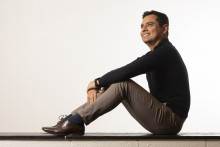Alejandro Moya Esteban
PhD research topic: Musculoskeletal electromyography-driven models for controlling back-support exoskeletons
Work: PhD candidate at the Neuromechanical Modeling & Engineering Lab, Faculty of Engineering Technology at the University of Twente
Education: Master’s degree in Biomedical Engineering (Neural & Motor Systems specialization) at the University of Twente
Originally from: Malaga, Spain
‘I work on exoskeletons for healthy individuals, more specifically back exoskeletons that support the lower back and help people who lift heavy objects. There are two main applications for our exoskeletons: factory workers who typically handle heavy weights and surgeons and nurses who have to lean forward for long hours during surgeries. Our device aims to support them and relieve their lower back muscles.
'If you don’t trust the person who should be supervising you, it’s really difficult'
Being able to help someone is the main motivation for my research. I can help solve a real health issue. About 85% of the world population will experience lower back pain at least once during their lifetime. If we can reduce this number even by a few percent, we will already be helping a lot of people. It’s a very practical research and I really enjoy that. I like applying engineering concepts to help people. I’m a very pragmatic person and I don’t like losing myself in theory.
I chose to study Biomechanical Engineering because it allowed me to combine math with helping people, but I didn’t envision that I’d end up working on exoskeletons. As a Bachelor student in Spain, I didn’t have a clue about what I wanted to do. I got in contact with research at the end of my master’s studies and realized I enjoyed it. Then I saw the opening for a PhD position working on exoskeletons with my supervisor – who was also my Master thesis supervisor – and I knew it’d be a good collaboration. I was lucky to know my supervisor before starting my PhD, because having the right supervisor is very important. Even when the supervisor is a good fit, there will be ups and downs on your PhD journey. If you don’t trust the person who should be supervising you, it’s really difficult. You need someone who gives you the right support.’
‘My PhD research is part of a project focused on developing wearable exoskeletons to augment or restore human motor functions. I am working on real-time musculoskeletal EMG-driven models to control trunk exoskeletons. The focus of my work is developing musculoskeletal models of the human body and using these models to estimate properties in the body, such as forces in the spine. My models are based on biological signals from the body, like muscle activity and kinematics, and can be used to drive robotic devices and exoskeletons. In a nutshell, I can use the internal properties in the body to control wearable robotic devices.
Thanks to the models I develop, the support from the exoskeleton can be automatically adjusted based on the actual weight that the user is lifting– the device is activated based on muscle activity. If the object is heavier, muscles activate more and vice versa. Unlike with other exoskeletons, I’m therefore able to provide adaptive assistance without any prior information about the weight of the object, because we get information directly from the body.’

‘When it comes to doing a PhD, there are a few things I didn’t expect. The one thing I really don’t like is the review process. I understand that peer review is very important in academia, but I also found out that you need to be lucky with your reviewer. Sometimes you might get a reviewer who clearly doesn’t understand your paper, or who doesn’t want to put in any effort, or who is simply having a bad day – and they are the reason why your paper is rejected. This ends up delaying and complicating your work a lot. As PhD candidates, we have a time limit. We have four years to get those publications out. If your paper is rejected, you might end up working on your PhD research after your contract is already ended, in your free time, taking holiday days just to finish the work you started. Because after four years of work, you just want to finish. One bad review can have really negative consequences for you.
'It’s not an easy journey but it is a very rewarding journey'
Time pressure is definitely the worst part of doing a PhD. The deadlines don’t give you time to really enjoy your PhD journey – and it is quite a journey. It is really long. Spending four years on the same project is a lot. I’m approaching the end of my contract and I’m definitely ready for a change. I want to learn new skills, discover new things, meet new people.
On top of that, your project is your responsibility. Four years with that responsibility can feel long. On the other hand, that comes with a great sense of achievement. You build up your confidence. The best thing about doing a PhD is how you grow as a professional and as a person. You learn a lot about your field, but you also acquire a lot of soft skills, like supervising students and managing your time. To sum up, doing a PhD is great but it’s hard. It’s not an easy journey but it is a very rewarding journey.’
‘After finishing my PhD, I plan to work in industry. I started my doctoral research right after my Master’s studies, and so I didn’t get any professional experience outside of academia yet. I don’t know what it’s like to work in a company and I’d like to find out. I’m open to anything new, but I definitely want to stay in the Netherlands. My partner is Dutch, and so that is a good reason to stay here.
'I feel that you have to be very optimistic to work in science and research. I tend to be more realistic or even pessimistic'
I really believe that 95% of people don’t know what they are getting into when they start their PhD. It’s so hard to know if you’ll like it in the beginning. I’m very glad I did it because of all the things I’ve learnt. I have no regrets, but it also made me realize that academia is not a good fit for me. I feel that you have to be very optimistic to work in science and research. You need to have great and noble ideas and follow them. I tend to be more realistic or even pessimistic. Just think of the exoskeletons. I think they are a wonderful idea, but in reality most people don’t want to wear them. They are uncomfortable, they hurt your skin, they feel weird. It’s a great idea that doesn’t necessarily work in practise – yet. That doesn’t mean that my work is useless, of course. My research is setting up basis for possible future applications. But personally, I want to be closer to the actual application.’

Discussion about work pressure among PhDs
Are you interested to hear more PhD stories and learn about the challenges doctoral candidates face? On Thursday, 13 April, Studium Generale is organizing a discussion about work pressure among PhDs. The event is organized in collaboration with U-Today and P-NUT and will be held in from 16:00 Amphitheater in the Vrijhof building.







